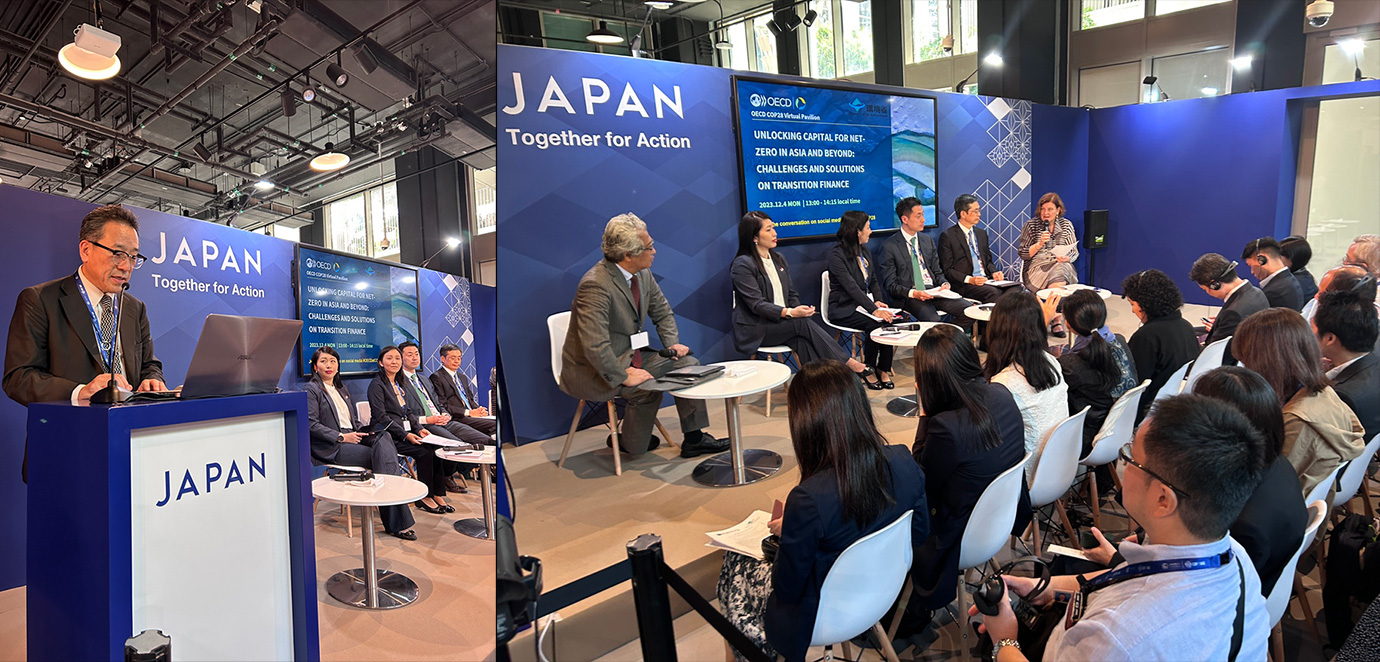2023.12.4 Mon.
- 13:00 - 14:15
- Unlocking capital for net-zero in Asia and beyond: challenges and solutions on transition finance
- Organizer
- Ministry of the Environment, Japan; Organization for Economic Cooperation and Development (OECD)
- Seminar abstract
-
Abstract
Asia is facing increasing vulnerabilities to climate change. Rising temperatures, increased frequency and severity of heatwaves, floods and storms, and sea level rise will increasingly challenge the region’s growth and development unless urgent mitigation and adaptation action is taken. At the same time, the region’s GHG emissions have been growing fast, with electricity and heat production being the largest and fastest-growing source of emissions, followed by manufacturing. Unlocking transition finance in Asia is rapidly needed to accelerate Asia’s decarbonisation of high-emitting and hard-to-abate sectors. In recent years, several government and market frameworks have been developed in Asia and other regions, namely national and regional transition taxonomies, sector-specific technology roadmaps, and standards for transition-related financial instruments, amongst others. In this event, organised jointly by the OECD and the Ministry of Environment of Japan, panellists will discuss key developments and progress made in Asia and other regions since last year in terms of development of transition finance policies and instruments. During the discussion, policymakers and market participants will share their best practices and challenges encountered and discuss ways to strengthen mechanisms to avoid carbon lock-in.
Program
Opening remarks -5 min-
Yutaka Matsuzawa Vice-Minister for Global-Environmental Affairs, Ministry of Environment, JapanPanel Discussion -40 min-
- Satoshi Ikeda Chief Sustainable Finance Officer, Financial Services Agency, Japan
- Kimiyo Hirowatari Manager, Business Support Group, Financial Planning Division, Mitsubishi Heavy Industries, Ltd
- Seiji Inagaki Director, Chair of the Board, The Dai-ichi Life Insurance Company, Limited.
- Mathilde Mesnard Deputy Director, Environment Directorate, OECD
- Gillian Koh Tan Assistant Managing Director and Chief Sustainability Officer, Monetary Authority of Singapore
- Justin Wu Managing Director, Co-Head of Climate Change Asia Pacific, HSBC
QA -15 min-
All PanelistsPanel Discussion -10 min-
All PanelistsClosing remarks
Satoshi Ikeda Chief Sustainable Finance Officer, Financial Services Agency, Japan
- Speakers
-
In-person
- Yutaka Matsuzawa Vice-Minister for Global-Environmental Affairs, Ministry of Environment, Japan
- Satoshi Ikeda / Chief Sustainable Finance Officer, Financial Services Agency, Japan
- Kimiyo Hirowatari / Manager, Business Support Group, Financial Planning Division, Mitsubishi Heavy Industries, Ltd
- Seiji Inagaki / Director, Chair of the Board, The Dai-ichi Life Insurance Company, Limited.
- Mathilde Mesnard / Deputy Director, Environment Directorate, OECD
- Gillian Koh Tan / Assistant Managing Director and Chief Sustainability Officer, Monetary Authority of Singapore
- Justin Wu / Managing Director, Co-Head of Climate Change Asia Pacific, HSBC
- Message and Results
-
The session highlighted the importance of transition finance, and the speakers shared and discussed current efforts to achieve decarbonization, challenges to be overcome, and the road ahead.
Various initiatives on transition finance led by the panelists were presented. For example, The Monetary Authority of Singapore shared their recently announced policy package to support transition finance, including the Finance for Net Zero Action Plan. The Dai-ich Life Insurance and the HSBC strengthened the role of investors and financial institutions, mentioning how they support their clients’ journeys towards net-zero through engagement. The Mitsubishi Heavy Industries shared its commitment to achieving carbon neutrality by 2040, which covers Scope 1, 2, and 3, as well as its experience of issuing a transition bond under their carbon neutral goal and strategy. Citing its recently released report, “Mechanisms to Prevent Carbon Lock-in in Transition Finance,” the OECD emphasizeds the need for national or sectoral GHG reduction pathways as well as frameworks for corporate transition plans to prevent carbon lock-in in transition finance.
Furthermore, the following points were discussed as future actions to take in order to unlock capital for net-zero:
Developing a framework to enable business expansion at a reasonable cost for already developed but not-economically-feasible technologies- Improving the comparability and interoperability of transition finance
- Supporting SMEs sustainability initiatives as they are under the pressure from financial institutions and value chains
- Developing country and sector-specific decarbonization pathways
- Discussing greenwashing with specific problems or deals not being too general on it as the meaning of greenwashing varies
- Developing a standard or framework for corporate transition plans
- Facilitating communication between investors and companies regarding the level of disclosure requirements

Other seminars on this day
2023.12.4 Mon.
- 10:30 - 11:45
-
Taking action together with ASEAN
Organizer:Ministry of Economy, Trande and Industry
- 14:45 - 16:00
-
The Role of Sovereign Bonds in Expanding GX Finance
Organizer:Ministry of Economy, Trade and Industry; Ministry of Finance; Ministry of the Environment
- 16:15 - 17:30
-
Financing the transition of high-emitting industries
Organizer:Glasgow Financial Alliance for Net Zero (GFANZ)
- 18:15 - 19:30
-
What JBIC can do toward Energy Transition /Creating a Hydrogen Supply Chain: Prospects and Challenges of Hydrogen Transport
Organizer:Ministry of the Environment, Japan Bank for International Cooperation(JBIC)
